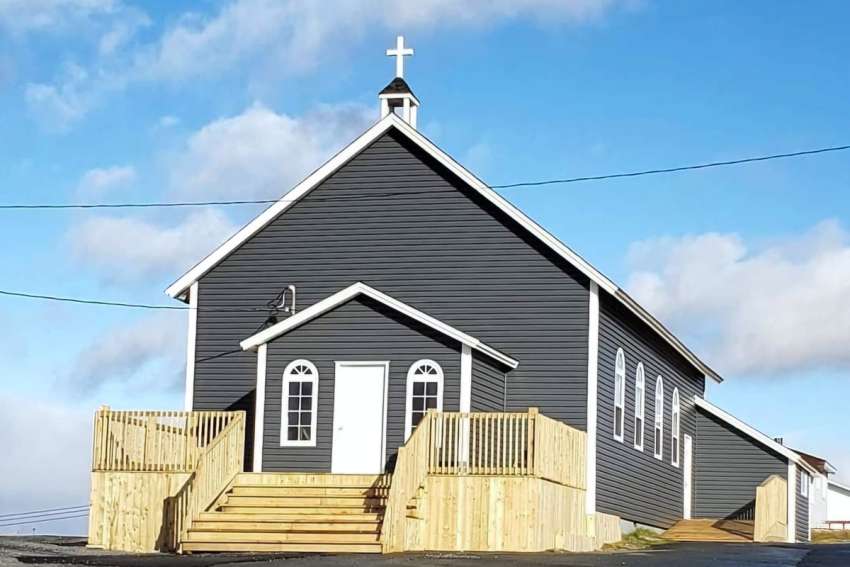Raised in a family of six, Power fondly spoke of attending Sunday Mass and receiving the sacraments at the local over-a-century-old Holy Rosary Parish.
Triggered in large part due to the federal government imposing a moratorium on cod fishing in July 1992, the population of Portugal Cove South has continually declined over the past three decades. The 2021 Canadian Census indicates the official number of residents is 86. Despite the many exoduses from the town, community members who remained could turn to Holy Rosary "as a constant source of strength," said Power.
Proven by the events of the past several weeks, Power and fellow parishioners are unafraid of taking bold action to safeguard their domain over this house of worship. They've taken charge of the church, changing the locks for Holy Rosary. Only Power and Clarence Molloy, the mayor of Portugal Cove South for the past 49 years, possess the new keys.
They executed this unprecedented maneuver upon discovering purchasing interest in their church following the Archdiocese of St. John’s movement to make it acquirable at under $50,000 as part of an ongoing court-supervised liquidation of assets.
In July, it was announced that the archdiocesan episcopal corporation owes $104 million to 292 plaintiffs — or their surviving loved ones — who suffered abuse at the Mount Cashel Orphanage between the 1940s and ‘60s. Following six successful appeals, $105,928,120 is now owed to 298 applicants.
Thus far, $43 million of that required sum has been accrued by the Archdiocese of St. John's via property sales and by transferring the control of 38 schools to the province and the Newfoundland and Labrador English School District.
Power said the community sprang into action upon receiving news from their 88-year-old pastor, Fr. Peter Golden, on Aug. 25.
“He informed the community and the parishioners that there was a bid going in on our church and it was about to be sold,” said Power. “We were like, ‘no way, we are not letting this church be sold on us.' We decided we would close the church for the fall and winter months.”
Following Mass on Sept. 1, unbeknownst to Golden, who also shepherds Holy Redeemer Parish in nearby Trespassey, Molloy and other volunteers secured the new locks.
“The reason for that was we didn't want anyone else to have access to the church and we didn't want anything removed from our church,” explained Power.
By keeping Holy Rosary closed for the foreseeable future, Power and members of the Portugal Cove South Historical Corporation hope to chill further bids. They will go to Holy Redeemer in the interim.
A new sign has also been installed near the main steps of the building. It reads: “No Trespassing. Property of PCS Historical Corporation and Community of Portugal Cove South.” It proceeds to identify people not welcome to the property “including but not limited to Archbishop (Peter) Hundt, staff of RCECSJ including real estate agents and lawyers affiliated with said persons.”
Additional window signs say “Our church is not for sale” and “potential buyers are not welcome.”
Hundt weighed in on the recent turn of events in an email to The Catholic Register.
“We know that the sale of church properties is a source of hurt and pain for all the Catholic communities of the Archdiocese, including Portugal Cove South," Hundt wrote. "However, it is the result of a court decision that we must accept and respect. Hopefully, if we can together accept the hurt and consequences of the sins committed against the innocent, then together we can move on to the healing, the reconciliation and the peace that God wishes us all to have.”
Responding directly to Hundt’s statement, Power said, “we are 100 per cent in agreement with those victims being compensated for the abuse that they received. And as far as we're concerned, that should have been dealt with by the Vatican. We feel that we should not be held responsible for the crimes of others.”
Portugal Cove South Catholics feel their defiant position is validated, considering the Vatican’s Dicastery of the Clergy has already overturned Hundt’s closures of Holy Rosary Parish in Portugal Cove-St. Philips and St. Patrick’s Church in St. John’s. This assemblage declared Hundt did not follow the proper canonical procedure for closing and selling a parish.
Specifically, the dicastery stated the archdiocese’s dire financial outlook and need to liquidate holdings “does not canonically affect the church building” of both aforementioned churches. Both rulings also declared that as “a juridic person” the parishes of St. Patrick’s and Holy Rosary has its own rights and obligations and the archdiocese had no right “to usurp the finances.”
Representatives of St. Patrick’s, Holy Rosary of Portugal Cove-St. Philips and Catholics from other parishes who sought to challenge the liquidation decisions following this shot in the arm from Rome began meeting with canon lawyer Philip Gray of the Ohio-based St. Joseph Foundation in April.
In addition to the Vatican rulings, Power said the community is heartened by the grassroots backing they have received from Catholics in B.C., Alberta, Ontario, Nova Scotia and New Brunswick.
“We would like to put out a heartfelt thank you to all the people from throughout this beautiful country who have been reaching out to us with heartfelt messages of encouragement and support,” said Power. “(They’re) encouraging us to stand up and to continue to fight for what's rightfully ours.
“I hope that the public can hear and see the strength and the endurance that we have to stand up for what we believe in,” said Power. “Even though we are a very small community, this does not make us any less important in this bigger scheme of things.”
Another driver of the congregation's actions is the fact churchgoers raised $134,000 to save the Holy Rosary building from crumbling five years ago. The fundraising drive secured upgrades for the roof, windows and siding.


